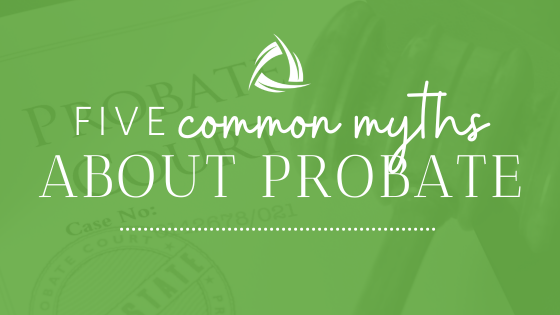The estate planning process can be complicated, leading to many people believing misconceptions that are heard through the grapevine. In reality, much of what we hear about estate planning and the probate process is simply not true. So, as you begin the process of estate planning and setting your family up for a smooth probate process, it is important to stop believing in these myths.
1. It Takes Years to Complete Probate
One of the things I hear the most is that probate takes years and years to complete. While, yes, probate is a longer process, it all depends on the size of the estate and the complexity within the court. Depending on the estate and its assets can change how long probate takes, and if there are any last will contests or lawsuits brought against the estate, that can also tack time on. However, more often than not, probate will usually last anywhere between six months to a year to complete.
2. Nothing Is Left of the Estate After Expenses and Taxes
The most frightening myth many believe is that probate will leave no money left over after everything is said and done. Probate does have its expenses, such as litigation costs or attorney fees, but it will all depend on the estate and the circumstances. No one’s probate process is the same, and many times, people will be surprised that it is not as costly as they had assumed. If the estate planning is done with probate expenses in mind, then there is less of a worry about there being no assets left.
3. To Get Out of Probate, You Just Need a Last Will
Not going through the probate process is a dream for many families, but simply having a last will and testament will not get you there. The last will is what is examined during probate. Now, there are ways to lower the amount of time probate takes up, but this all depends on the estate planning done beforehand. Trusts can offer a great way to keep assets out of the probate process. But simply relying on a last will is not a way to get out of probate; you must plan accordingly.
4. The State Takes Everything If You Don’t Have a Last Will
One of the fears people might have is that if their family member did not have a last will, all of their assets would be given to the state. However, this is not the case, and the assets will simply follow the intestate succession laws within your state. For example, Missouri intestate succession laws state that assets will be distributed to the living spouse or the living spouse and living descendants. Or, if neither of those is available, assets will be distributed to siblings and, beyond that, grandparents. If there is no last will, you are not at a loss. The state can help protect the assets and keep them in the family.
5. You Do Not Need an Attorney to Navigate the Probate Process
Lastly, many think the probate process is simple as long as you have a last will, some trusts, and beneficiaries lined up. However, an attorney is an essential piece of the picture to ensure the process itself and all your prior estate planning are true to your wishes both legally and on paper. If you don’t want assets falling through the cracks or want to ensure assets are given to certain people without a fight, an attorney can ensure that. It is time to quickly debunk this myth to protect you, your family, and your assets.
Estate planning and the probate process can cause a lot of confusion. Don’t let that confusion cloud your choices. If you are starting the estate planning process, contact the Hartmann Law team today!

